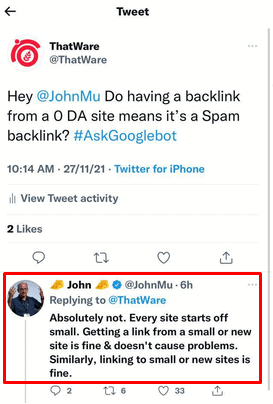SUPERCHARGE YOUR ONLINE VISIBILITY! CONTACT US AND LET’S ACHIEVE EXCELLENCE TOGETHER!
Have you ever wondered why Google hasn’t adjusted PageRank since 2013? Something tells us that it wasn’t Google’s way of approving of Domain Authority. Domain Authority is a fascinating measure. Who doesn’t want to know how a website ranks out of 100? It can also be a very useful measure at times.

However, DA is not a number we use to assess SEO performance. In terms of success, we don’t consider a rise in DA to be a good statistic for a successful link building strategy. It’s a difficult statistic that doesn’t always tell the whole story.
As an example, the most recent DA upgrade essentially ground everything to a halt. Nonetheless, our clients’ ranks and traffic increased.
The authority of a domain name does not convey the whole picture. As a result, it cannot be used as a statistic to determine the effectiveness of a link building strategy. There have been cases where an algorithm update reduces DA across the board. Nonetheless, our clients’ rankings and traffic continue to rise. Obviously, the most significant measures for measuring the effectiveness of a link building strategy are rankings and traffic.
Every time, relevance triumphs.
An irrelevant domain with a high DA score can’t compete with a site that’s blazing on all cylinders when it comes to relevancy. Of course, there will be sites with a high DA value that are very relevant to any specific site. Those are the internet’s unicorns.
But let us be clear: both relevance and authority are important.
Both should be considered while creating links.
But, if we had to pick one to prioritize, we’d go with relevancy above domain authority every time. That’s not to suggest Domain Authority isn’t beneficial sometimes.
Let’s look at some of the reasons why we choose relevance over DA, yet DA has its uses as well.
Why Is Domain Authority Important?
We’ve previously established that DA isn’t the be-all and end-all of everything. So, what exactly is it? What function does it play in the process of link building?
Here’s what Moz has to say about it:
“Domain authority is a Moz-developed search engine ranking score that predicts how well a website will rank on search engine result pages” (SERPs). A Domain Authority score goes from one to one hundred, with higher values indicating a stronger capacity to rank.“
This computation takes into account a number of elements. Some examples include the overall number of links, connecting root domains, and a variety of additional signals (over 40!).
We have no idea what all 40 of these signals are.
Expect this score to change regardless of how excellent your SEO efforts are.
To evaluate the performance of your link building efforts, you should ideally utilize Domain Authority as a comparative statistic rather than an absolute one.
Understanding the Significance of Backlinks
In the dynamic landscape of online business and digital marketing, the significance of backlinks cannot be overstated. Backlinks, especially from authoritative sources, play a pivotal role in enhancing a website’s visibility, credibility, and search engine rankings.
Streamlining the Link Building Process
However, acquiring these coveted links can be a daunting task, often requiring extensive research, outreach, and relationship-building efforts. This is where authority link software emerges as a game-changer.
Comprehensive Domain Analysis
One of the key features of authority link software is its ability to conduct comprehensive domain analysis, evaluating the authority, relevance, and trustworthiness of potential linking sources. By analyzing factors such as domain authority, page rank, inbound link profile, and content quality, the software can identify websites that are most likely to provide valuable backlinks that positively impact search engine rankings.
Facilitating Outreach Efforts
Furthermore, authority link software employs sophisticated outreach capabilities to facilitate communication with website owners and administrators for link acquisition purposes. Through personalized email templates, automated follow-ups, and performance tracking metrics, the software streamlines the outreach process, increasing the likelihood of securing valuable backlinks from high-authority websites.
Efficient Management Tools
In addition to link acquisition, authority link software offers robust management tools to monitor the status and performance of acquired backlinks. Users can track key metrics such as link velocity, anchor text diversity, and referral traffic, allowing them to optimize their link building strategies for maximum effectiveness.
Gaining Competitive Insights
Moreover, the software provides insights into competitor link profiles, enabling users to identify new opportunities and stay ahead of the competition.
Enhancing Online Presence
The benefits of authority link software extend beyond individual link building campaigns, contributing to the overall success and sustainability of a website’s online presence. By acquiring high-quality backlinks from authoritative sources, websites can enhance their domain authority, improve search engine visibility, and attract targeted organic traffic.
Future-Proofing Strategies
Furthermore, authority link software plays a crucial role in future-proofing websites against algorithm updates and search engine penalties. By focusing on quality over quantity and adhering to ethical link building practices, websites can build a strong foundation for long-term success in the ever-evolving digital landscape.
Domain Authority Is Observable
That is the DA score’s main attraction. We are preoccupied with percentages, statistics, and comparing numbers as humans.
A score of 100 is measurable and definite. It simplifies the lives of marketers. You may pit one website against another and see who comes out on top based on a simple score.
A DA score makes it easy to tie your SEO efforts to a concrete figure. You put in the time and effort. You enhance every area of your SEO. And there it is, glaring back at you: a huge fat number describing how “excellent” your site is.
That’s a valuable asset.
Start The Role of Backlinks in SEO
What Are Backlinks?
Backlinks, also known as inbound links, are links from one website to another. In the context of SEO, backlinks are important because they act as a vote of confidence from one site to another, signaling to search engines like Google that the linked content is valuable, credible, and relevant. Essentially, when one website links to another, it’s saying, “This content is worth checking out.”
Backlinks are crucial because they influence how search engines rank websites. Google uses backlinks as a key ranking signal, with the understanding that when a website links to another, it is endorsing that content. The quality and quantity of backlinks pointing to a site are integral in determining its position in search engine results pages (SERPs).
The Role of Backlinks in Google’s Algorithm (PageRank, Trust, Relevance)
Google uses backlinks as a primary factor in its PageRank algorithm, which determines the importance of a web page. PageRank measures the quantity and quality of backlinks to a page to assess its trustworthiness. Websites with more high-quality backlinks tend to rank higher because Google views them as authoritative.
Backlinks contribute to two major aspects in SEO:
- Trust: Websites with backlinks from reputable sites are considered more trustworthy, which boosts their search engine rankings.
- Relevance: Backlinks from relevant websites within the same niche or industry are viewed more favorably than those from unrelated sites.
How Backlinks Influence Domain Authority (DA)
Backlinks as a Ranking Factor
One of the most important ways backlinks influence Domain Authority (DA) is by boosting a site’s credibility. Google perceives high-quality backlinks as a signal that a website offers valuable content. Over time, accumulating authoritative backlinks improves a website’s DA and search engine ranking.
How Quality Backlinks Improve a Website’s Authority
When a website receives backlinks from high-DA sites, the site’s own authority is positively affected. This is because backlinks from authoritative websites transfer some of that site’s link equity or “link juice” to the linked site. This is particularly important because high-quality backlinks indicate trustworthiness and relevance in the eyes of search engines.
Do Backlinks from Low DA Websites Help?
Case Studies and Expert Opinions
The question of whether backlinks from low DA websites impact SEO positively or negatively is a topic of debate among SEO experts. While backlinks from high-authority websites are always more beneficial, backlinks from low DA websites can still provide value under certain circumstances.
For instance, some case studies suggest that backlinks from low DA sites can help increase a site’s visibility in the short term, particularly if the backlinks come from relevant, niche-specific websites. However, in most cases, backlinks from low-DA websites offer minimal SEO benefit when compared to those from high-authority websites.
The Difference Between High-Quality and Low-Quality Backlinks
High-quality backlinks come from authoritative, relevant websites, often with substantial traffic and engagement. These links help a site improve its ranking and visibility. On the other hand, low-quality backlinks typically come from irrelevant or low-traffic websites and can even hurt a site’s SEO if Google perceives them as spammy.
Risks of Backlinking on a 0 DA Website
Google’s Trust and Spam Issues
Potential Spam Signals Sent to Google
Google evaluates backlinks as a signal of trustworthiness. Backlinks from websites with 0 DA, which are often seen as newly established or spammy, may not carry much trust with Google. Moreover, Google may flag these websites as suspicious if they have unnatural link patterns or content that lacks quality, potentially harming the credibility of a website that links to them.
How Google Views Websites with Little or No Backlinks
Websites with no backlinks, or 0 DA websites, often struggle with Google’s trust algorithm. Without a network of incoming links, these websites may not rank highly or could even be penalized if Google determines they are trying to artificially inflate their SEO by linking to low-authority sites.
Low Traffic and Relevance
The Potential for Linking to a Website that Lacks Significant Traffic
Low-traffic websites with 0 DA may not offer much SEO value for the sites they link to. Backlinks from high-traffic websites can drive referral traffic and improve rankings, while backlinks from low-traffic sites may not provide these benefits.
Why Relevance is Crucial When Building Backlinks
Backlinks from relevant websites within the same industry or niche carry more weight. Even if a website has 0 DA, if it is highly relevant to the target website’s content and audience, it can still offer SEO value. Irrelevant links, on the other hand, can harm your SEO efforts.
The Potential for Negative SEO
Could Backlinks from a 0 DA Website Harm Your Overall SEO Strategy?
Yes, backlinks from 0 DA websites could potentially harm your overall SEO strategy, especially if Google perceives the site as spammy or irrelevant. If a website accumulates too many backlinks from low-authority sources, it could attract penalties or lose trust in Google’s eyes, leading to decreased visibility.
Risks Associated with Linking to an Untrusted, Low-Authority Site
Linking to low-authority or spammy sites can result in negative SEO effects. Google may associate the linking website with low-quality sources, leading to a drop in rankings for the website.
Benefits of Backlinking on a 0 DA Website
Starting with a Fresh Website
Opportunity to Build Backlinks from Scratch
Backlinking on a 0 DA website gives you a chance to build a solid foundation for SEO from the beginning. This allows you to control the quality of backlinks you receive and avoid relying on low-quality, spammy links that could hurt your SEO in the long run.
Growing Your Website’s Authority Organically
A 0 DA website has room to grow. As your website gains quality backlinks and increases its authority over time, you’ll have the opportunity to increase your DA and improve your rankings in search engine results.
Building Relationships and Networks
How Linking to or from a 0 DA Website Can Help Establish Partnerships
By starting on a 0 DA website, you have the opportunity to collaborate with other site owners, particularly in niche markets. These early-stage relationships can help grow your backlink profile and lead to more valuable partnerships in the future.
Getting Indexed Faster
How Backlinks from a 0 DA Website Might Help with Faster Indexing
Websites with 0 DA may benefit from backlinks as they can help establish a presence on search engines. While these backlinks may not carry as much authority, they can still help with indexing, allowing your website’s content to appear in search results more quickly.
Evaluating the Quality of Backlinks on a 0 DA Website
Content Quality Over DA
Why the Quality of Content Matters More Than the DA of a Website
When considering backlinks, content quality is paramount. Even a low DA website can offer valuable SEO benefits if it produces high-quality, relevant, and informative content. Quality content attracts better backlinks, engages readers, and increases traffic, all of which contribute to improving SEO.
Relevance of the Backlinking Site
Importance of Niche Relevance in Backlinks
A website with 0 DA can still be valuable for backlinking if it’s highly relevant to your industry. Relevance plays a larger role than DA when it comes to effective backlinking because search engines care more about the context of the link than the sheer number of backlinks from high-authority sites.
Growth Potential and Long-Term Strategy
Building Backlinks on Websites with Growth Potential
A website with 0 DA that is growing rapidly in terms of content, traffic, and authority can offer significant SEO benefits in the long run. By building backlinks on such sites early in their development, you can take advantage of their growth potential.
Strategies for Backlinking on a 0 DA Website
Starting with Content Strategy
Importance of Creating High-Quality, Shareable Content
Focus on creating valuable, shareable content that attracts natural backlinks. Engaging blog posts, infographics, and guides can make it easier for other sites to link back to your website.
How to Build Relationships for Backlinking
Tips for Reaching Out to Other Website Owners and Collaborating
Networking with niche bloggers, influencers, and content creators can help you build backlinks. Outreach should focus on offering value, such as guest posts, collaborations, or content partnerships.
Building Natural Links Over Time
Focus on Earning Backlinks Through Natural Methods
Building backlinks should be a gradual process. Focus on providing quality content that naturally attracts links. Engage with other websites and communities to encourage organic link building.
Case Studies and Expert Opinions
Case Study 1: Backlinking on a 0 DA Website
A case study where backlinking from a low DA website helped boost rankings in the long term. By focusing on quality content and relevance, this site successfully leveraged backlinks.
Case Study 2: Why Backlinking on 0 DA Didn’t Work
Another case where backlinking from a low DA website resulted in negligible SEO improvement, showcasing the importance of backlinks from relevant, high-authority sites.
Alternatives to Backlinking on a 0 DA Website
Focus on High DA Websites for Backlinks
Why It Might Be Better to Aim for Backlinks from Established Websites
Backlinks from high-authority websites provide more link equity, making them more effective for SEO.
Building a Strong Internal Linking Strategy
Importance of Internal Linking for SEO
Internal linking helps boost SEO by guiding search engines through your site’s pages, helping them understand the content and structure of your website.
Other SEO Strategies
Exploring Other SEO Strategies
In addition to backlinks, consider optimizing on-page content, technical SEO, and using social media to drive traffic and enhance your SEO strategy.
Why Do Relevant Links Matter More Than Domain Authority?
Despite all of the advantages of DA, it should never be the primary deciding factor when pursuing a link. After all, DA does not establish the significance of one site with respect to another. When it comes to creating links, relevancy takes precedence over everything else since these are the links that are actually in their native home.
These are genuine natural connections.
That is precisely what relevancy means. A link to a website when the destination page is relevant and valuable to the user. It makes sense for users, which implies it makes sense for search engines as well. Regardless of DA, it’s a nice, high-quality connection.
Users will be happy with the outcomes if they click on it. After all, that is the entire goal of a link: to connect and bridge internet pages in order to provide a better user experience.
Here’s what John Muller had to say about it:

“Absolutely not. Every site starts off small. Getting a link from a small or new site is fine& doesn’t cause problems. Similarly, linking to small or new sites is fine.”
Relevance Is A Foregone Conclusion.
If the target site is related to my target site, has decent content, and passes the “run by real humans” condition, then my link should go there. There are certainly many excellent sites with low DA rankings for a variety of reasons.
They feature fantastic information, and a wonderful user experience, are curated by humans and are relevant to a client’s speciality. They just do not have the magical number associated with them. That domain has been around for a long time, and people trust it. It will undoubtedly ignore link juice.
Yields Of Relevance Conversions And Referral Traffic That Is Targeted
It’s easy to become bogged down in the details of link building and SEO. More particular, it should power your company’s marketing and sales pillars by influencing conversions.
The first stage in that approach is to generate highly focused referral traffic. The higher the quality of traffic flowing in at the top of your funnel, the more efficient your entire system will be.
We can confidently state that relevancy is superior for driving the sort of traffic that leads to conversions.
But, can’t more authoritative sites bring even more traffic? Maybe, but without relevance, you have little chance of converting clients.
We’ll explain why.
Relevance implies context, and a link that makes contextual sense is always preferable from the standpoint of the user. For a moment, put yourself in the shoes of a user. The average website visitor has no idea what DA is. They’re on a website, either reading material or looking into a product or service.
When a user hits an external link, they have a certain intent and expectation that the destination website will meet those expectations. In this instance, domain authority is meaningless.
It is a relevant link that will guarantee that the user obtains interesting and topical information. Anything less, and you’ve lost a prospective lead. If the destination page isn’t relevant or valuable, you can bet they’ll leave and never return. Take my word for it, but don’t simply take my word for it.
Relevance Outperforms Domain Authority As A Ranking Signal.
That first page of organic search results is precious real estate. Every marketer wants it, but obtaining it is a difficult task. Many individuals argue that because relevance isn’t as definite as DA, it’s not as potent a ranking indication. That may be the case in an SEO world where the user doesn’t matter. However, this is an extremely erroneous viewpoint. Consider this.
A relevant link is the one that makes the most sense to a user since it is likely to match their aim. If the material on a specific page is more useful to the user, it is unquestionably a more click-worthy link. When you rank first in organic search, your click-through rate is several folds higher than the guy in second place.
Isn’t it in search engines’ best interests to present the most relevant stuff at the top? Yes, it is. The same reasoning applies here. It makes sense for users, which implies it makes sense for search engines as well. Regardless of DA, it’s a nice, high-quality connection. Users will be happy with the outcomes if they click on it.
That is the entire purpose of a link — linking and bridging internet pages to improve the overall user experience. The top-ranking material is determined by what the user will find most valuable in their search query. You won’t go wrong if you stick to that idea.
Relevance Scales Higher Than Domain Authority
Let me tell you something. Tangibility is not necessarily a speculative characteristic. It is not without flaws. For one thing, if it’s measured, it’s always in flux. Domain authority can fluctuate.
Given that we don’t know every single component that goes into the computation, these variations might not necessarily be your fault. This might be either disastrous or beneficial. Let’s start with the positive: you may work on enhancing your authority.
Relevant links, as a result, have the potential to become authoritative over time. That is what I mean by “scalable.” But it isn’t all.
As you are aware, high-authority connections are scarce and tough to obtain. It is far easier to amass a large list of relevant links in your niche than it is to locate authoritative links. You’ve already reduced your prospect pool if you opt to target just authoritative sites. You’ll have fewer links, and the chances of them being related to your site are just as low. If we’re talking about high-impact, low-effort marketing, I’d put my money on relevant links any day.
That is not to claim that locating relevant connections is always simple and painless. However, you will undoubtedly get compensated more for your efforts.
Relevant Links Are More Organic And Long-Lasting Than Domain Authority.
It’s impossible to discuss link-building without mentioning sustainability. The ideal natural connection is a relevant link. They are the outcome of having high-quality linkable assets rather than intentionally influencing Google’s algorithm.
The surface measurements can only get you so far, but it all comes down to two things:
- Creating material worth connecting to
- Linking to stuff that your audience would find useful
Placing a target on relevance is the most certain and natural method to hit these sweet spots. Indeed, significance has a cascading impact. Focusing on high-quality linkable items can boost your authority and build your complete SEO profile. Nothing beats plain, old-fashioned relevancy when it comes to choosing target sites for a link building effort.

Thatware | Founder & CEO
Tuhin is recognized across the globe for his vision to revolutionize digital transformation industry with the help of cutting-edge technology. He won bronze for India at the Stevie Awards USA as well as winning the India Business Awards, India Technology Award, Top 100 influential tech leaders from Analytics Insights, Clutch Global Front runner in digital marketing, founder of the fastest growing company in Asia by The CEO Magazine and is a TEDx speaker and BrightonSEO speaker..


